Fleurs du Mal Magazine


Or see the index
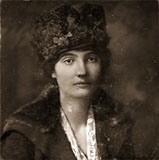
Approach
Apparelled in a mask of joy till now,
I knew thee not. Asleep, I see thy face
More simply. Sorrow s leisure lets me trace
The nicer lines. Thy sealed lids, thy brow,
Thy lasting posture, purposes avow ;
In thy spent form resides a moveless grace.
A pageant was thy life, and in its place
I find a truth to feed and to endow
My heart. Thy wonted mask of joy belied
The meaning death s bare attitude makes clear.
From living gesture thought went often wide,
And I was poor interpreter ; but here,
Where it would seem our thoughts anew divide,
The steady silence draws thy spirit near.
Gladys Cromwell
(1885-1919)
Approach
From: Songs of the Dust, 1915
• fleursdumal.nl magazine
More in: Archive C-D, Archive C-D, Cromwell, Gladys, Gladys Cromwell
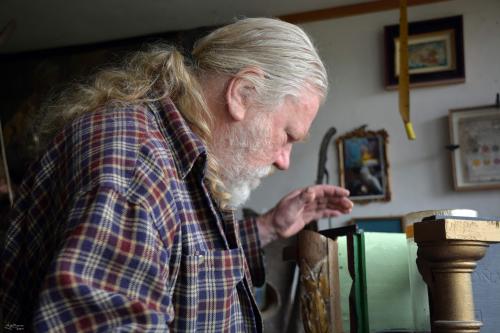
Assemblages Wijnand van Lieshout: Tentoonstelling ‘Wagon-Lits-Expresse’ in het ‘Metropolitan Museum | Tilburg’
Wijnand van Lieshout, de nestor onder de Tilburgse kunstenaars, toont recent werk in de raamtentoonstellingen aan de Stedekestraat (‘Metropolitan Museum | Tilburg’). Zijn tentoonstelling ‘Wagon-Lits-Expresse’ loopt nog tot en met vrijdag 30 november 2019 en is dag en nacht bereikbaar.

Wijnand van Lieshout maakt absurde assemblages van antieke rekwisieten, in onmin geraakte gebruiksvoorwerpen en geconserveerde delen van beesten, met name schaal- en schelpdieren. Hij gebruikt geteisterde objecten, zoals oude gereedschappen, afgedankte medische voorwerpen en ontluisterde meubelen. Wijnand van Lieshout is gefascineerd door het verval in al zijn hoedanigheden. Deze teloorgang wordt uitgedrukt door de dikke lagen stof die zijn kunstwerken sieren. Zijn werk is erotisch getint en uiterst theatraal, volgens de kunstenaar: ‘Een wal van verpaupering treedt u tegemoet!’

De tentoonstelling bestaat uit tien nieuwe werken. Eén werk is hier helemaal op zijn plaats, het is namelijk geïnspireerd door het leven van een novice achter slot en grendel in het voormalige Clarissenklooster om de hoek. Een ander werk, ‘Vrouw van Neptunus’, is een magistraal werk, waarin een zeenimf zich te goed doet aan een aangespoelde dildo. De overige werken zijn navenant, absurd, tragikomisch en wentelend in de onuitputtelijke fantasie van de oude meester kunstenaar.
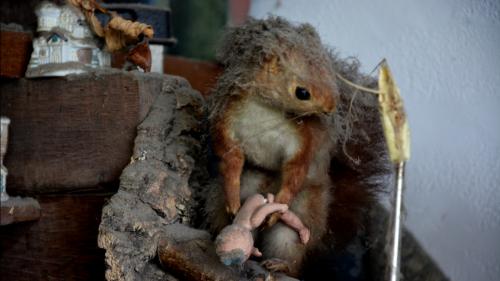
Wijnand van Lieshout (1940) is een geboren en getogen Tilburger. Hij volgde hier zijn kunstopleiding aan de ‘R.K. Leergangen’ vanaf 1957, studeerde verder aan de ‘Jan van Eijck Academie’ in Maastricht en het ‘Nationaal Hoger Instituut voor Schone Kunsten’ in Antwerpen. In 1970 keerde hij terug naar zijn geboortestad, waar hij zich toelegde op geënsceneerde fotografie, installaties en assemblages. Van Lieshout exposeerde o.a. samen met Erwin Olof in Amsterdam, met Niko de Wit in Tilburg, in het ‘Noordbrabants Museum’ in Den Bosch en reizende tentoonstellingen in België, Duitsland en Japan. Nu te zien in het ‘Metropolitan Museum – Tilburg’ aan de Stedekestraat’. Belangstellenden zijn van harte welkom!
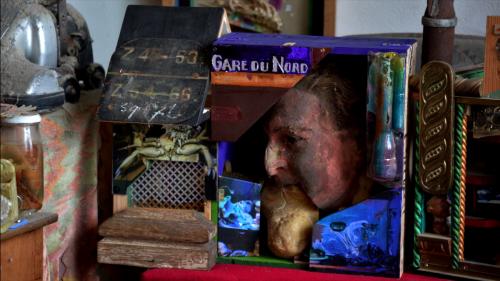
Praktische gegevens: gratis raamtentoonstelling ‘Wagon-Lits-Expresse’ van Wijnand van Lieshout, dagelijks 1 november t/m 30 november 2019 in het ‘Metropolitan Museum | Tilburg’, Stedekestraat 15 | 5041DM Tilburg, telefoon 013 5358041 | 06 20325030, mail post@metropolitanmuseum.nl, site www.metropolitanmuseum.nl

METROPOLITAN MUSEUM | TILBURG
15 Stedekestraat | 5041DM Tilburg | Netherlands
www.metropolitanmuseum.nl
# tentoonstelling ‘Wagon- Lits-Expresse’ nog tot en met vrijdag 30 november 2019, dag en nacht bereikbaar.
# photos – text – movie: Sjon Brands & Dorith van der Lee / Metropolitan Museum – Tilburg
• fleursdumal.nl magazine
More in: - Book News, - Objets Trouvés (Ready-Mades), Art & Literature News, AUDIO, CINEMA, RADIO & TV, DADA, Dadaïsme, Dutch Landscapes, Exhibition Archive, FDM Art Gallery, Metropolitan Museum Tilburg, Photography, Sculpture, Sjon Brands, Theater van de Verloren Tijd, Wijnand van Lieshout

Cour
Brieven zweven gangen in vol leugens zonder
wonden, op iedere verdieping. Zicht daarop
vanaf de binnenplaats. Binnen zeggen spiegels:
Geen mens. Naar buiten wordt niet gekeken. Er
gaat een ochtend volgen om nimmer te vergeten.
Bert Bevers
Ongepubliceerd
Juli 2019
• fleursdumal.nl magazine
More in: Archive A-B, Archive A-B, Bevers, Bert
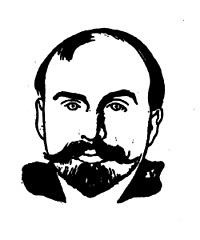
La Lumière
La lumière bleue est passée,
Allons vers les lumières blanches.
O chérie es-tu donc lassée?
Nous avons des ailes aux hanches,
Puisqu’on nous a chassés du bleu,
Ouvrons, chérie, ouvrons nos ailes,
Voguons comme des caravelles
Vers le soleil tout blanc de feu.
La lumière blanche est passée,
Allons vers la lumière rouge.
M’amour, je te tiens embrassée,
J’ai mon couteau sanglant qui bouge.
Vivons ici dans le vermeil.
Ton petit doigt aura pour bague
Un coeur foré d’un coup de dague:
J’ai de l’or -as-tu point sommeil.
La lumière rouge est passée,
Allons vers la lumière verte.
Viens chauffer ta gorge glacée:
Entrons, la porte est grande ouverte.
Buvons tout cet or vert fondu;
Buvons, nous verrons monter, lentes,
Des flammes blanches et sanglantes.
Mignonne, m’as-tu répondu?
La lumière verte est passée,
Allons vers la lumière pâle,
Allons: notre forme effacée
Glissera sous ces flots d’opale.
Marcel Schwob
(1867-1905)
La Lumière
Portrait: Félix Vallotton
• fleursdumal.nl magazine
More in: Archive S-T, Archive S-T, Félix Vallotton, Marcel Schwob
Die schöne junge Braut
Es ging einmal ein hübsches Landmädchen in den Wald, um Futter für ihre Kuh zu holen; wie sie nun in Gottes Namen grasete und an gar nichts Arges dachte, so kamen auf einmal vier Räuber, umringten sie und führten sie mit sich fort, ohne Gnad und Barmherzigkeit, sie mochte schreien und zappeln, bitten und betteln so viel sie wollte. Weit ab von des Mädchens Heimat in einem finstern Walde hatten die Räuber ein Haus, worin sie sich aufhielten, wenigstens blieben immer einige daheim, wenn die andern auf Raub auszogen. Dem Mädchen taten aber die Räuber weiter nichts zu Leide, als daß sie sie eben aus ihrer Heimat fortführten, und sie in dem Hause gleichsam gefangen hielten; sie mußte den Haushalt besorgen, kochen, backen und waschen, sonst hatte sie es gut, wurde aber immer scharf bewacht. Dabei hatten ihr die Räuber den Namen gegeben: Schöne junge Braut.
So war nun das Mädchen schon einige Jahre in der Räuberherberge, als es sich einmal traf, daß ein Hauptraub ausgeführt werden sollte, an dem, wenn er gelingen sollte, die ganze helle Bande teilnehmen mußte.
 Da das Mädchen sich an das Leben in der Räuberhöhle gewöhnt zu haben schien, auch noch keinen Versuch zu entfliehen gemacht hatte, und auch schwerlich durch den wilden Wald die Wege finden würde – so dachte der Hauptmann – so blieb sie diesesmal allein und unbewacht im Waldhause zurück. Aber die Räuber waren kaum fort, so sann die schöne Braut darauf, wie sie unerkannt entfliehen könne. Sie machte geschwind eine Gestalt von Stroh, zog derselben ihre Kleider an, setzte ihr ihre Haube auf, sich selbst aber bestrich sie von Kopf bis zu den Füßen mit Honig, wälzte sich darauf über und über in Federn, so daß sie ganz unkennbar wurde, und aussah, wie ein seltsamer Vogel. Die Gestalt in ihren Kleidern lehnte sie an ein Fenster über der Haustür, und ließ sie hinaussehen, doch mit verdecktem Gesicht, und dann eilte sie von dannen.
Da das Mädchen sich an das Leben in der Räuberhöhle gewöhnt zu haben schien, auch noch keinen Versuch zu entfliehen gemacht hatte, und auch schwerlich durch den wilden Wald die Wege finden würde – so dachte der Hauptmann – so blieb sie diesesmal allein und unbewacht im Waldhause zurück. Aber die Räuber waren kaum fort, so sann die schöne Braut darauf, wie sie unerkannt entfliehen könne. Sie machte geschwind eine Gestalt von Stroh, zog derselben ihre Kleider an, setzte ihr ihre Haube auf, sich selbst aber bestrich sie von Kopf bis zu den Füßen mit Honig, wälzte sich darauf über und über in Federn, so daß sie ganz unkennbar wurde, und aussah, wie ein seltsamer Vogel. Die Gestalt in ihren Kleidern lehnte sie an ein Fenster über der Haustür, und ließ sie hinaussehen, doch mit verdecktem Gesicht, und dann eilte sie von dannen.
Mochte es aber nun sein, daß dem Hauptmann eine Ahnung von des Mädchens beabsichtigter Flucht kam, oder daß etwas vergessen worden war, genug, er sandte einige seiner Räuber nach dem Hause zurück, und gerade mußte es sich treffen, daß ihnen auf ihrem Wege das fiedrige Käuzlein aufstieß. Sie dachten aber es wäre einer ihrer Kumpane, der sich unkenntlich gemacht hätte, und riefen die Gestalt lachend und fragend an:
»Wohin, wohin, Herr Federsack?
Was macht die schöne junge Braut?«
Diese, die es selbst war, war zwar sehr erschrocken, doch faßte sie sich ein Herz und antwortete mit verstellter Stimme:
»Sie fegt und säubert unser Haus
Und schaut wohl auch zum Fenster heraus!«
Damit machte sie, daß sie den Räubern aus dem Gesichte kam, kam auch glücklich aus dem Walde,  erreichte ein Dorf, kaufte sich Kleider, badete sich und erlangte glücklich und wohlbehalten, obschon nach langer Wanderung, ihre Heimat wieder, und da sie nicht gerade das Beste in der Räuberherberge zurückgelassen hatte, sondern für ihren Jahrlohn mitgehen heißen, so hatte sie auch wohl zu leben und heiratete einen wackern Burschen.
erreichte ein Dorf, kaufte sich Kleider, badete sich und erlangte glücklich und wohlbehalten, obschon nach langer Wanderung, ihre Heimat wieder, und da sie nicht gerade das Beste in der Räuberherberge zurückgelassen hatte, sondern für ihren Jahrlohn mitgehen heißen, so hatte sie auch wohl zu leben und heiratete einen wackern Burschen.
Jene Räuber, wie die nun des Hauses ansichtig wurden, sahen die Gestalt der schönen jungen Braut am Fenster und grüßten schon von weitem, indem sie riefen:
»Grüß Gott, o schöne junge Braut,
Die freundlich uns entgegenschaut.«
Da aber der Gruß unerwidert blieb, so verwunderten sich die Räuber, und als sie näher kamen, vermeinten sie, die schöne junge Braut sei eingeschlafen. Vergebens riefen sie, sie ermunterte sich nicht; vergebens geboten sie ihr, zu öffnen, alle ihr Pochen und Schreien, Rufen und Schelten war erfolglos, und wütend traten sie zuletzt die Türe in Trümmern, stürmten die Treppe hinauf und faßten die Gestalt der schönen jungen Braut hart an, da fiel ihnen die Strohpuppe in die Arme. Da riefen die Räuber:
»Fahr wohl, du schöne junge Braut!
Ein Tor ist, wer auf Weiber baut!«
Ludwig Bechstein
(1801 – 1860)
Die schöne junge Braut
Sämtliche Märchen
• fleursdumal.nl magazine
More in: - Book Stories, Archive A-B, Bechstein, Bechstein, Ludwig
Antony Kok
schrijver en experimenteel dichter
door Jef van Kempen
Antony Kok werd op 18 april 1882 in Rotterdam geboren, als zoon van Pieter Kok en Sophia Hagen. Zijn vader was adjunct-commies bij de Staatsspoorwegen. Antony Kok overleed op 29 oktober 1969 te Haarlem.
 Het grootste deel van zijn jeugd woonde Antony Kok in het Limburgse Maasbree. Na zijn middelbare schooltijd trad hij in het voetspoor van zijn vader door in 1899 ook bij de Staatsspoorwegen te gaan werken. Na eerst in ‘s-Hertogenbosch en Oisterwijk als klerk-telegrafist te hebben gewerkt kwam hij in 1908 naar Tilburg, waar hij het na verloop van tijd tot chef-commies zou brengen.
Het grootste deel van zijn jeugd woonde Antony Kok in het Limburgse Maasbree. Na zijn middelbare schooltijd trad hij in het voetspoor van zijn vader door in 1899 ook bij de Staatsspoorwegen te gaan werken. Na eerst in ‘s-Hertogenbosch en Oisterwijk als klerk-telegrafist te hebben gewerkt kwam hij in 1908 naar Tilburg, waar hij het na verloop van tijd tot chef-commies zou brengen.
De eerste tien jaar woonde Kok, die zijn hele leven ongehuwd bleef, op kamers boven slagerij De Brouwer in de Tuinstraat. Hij zou in Tilburg later nog vier maal verhuizen.
In 1914 raakte Antony Kok bevriend met de Amsterdamse schrijver en schilder Theo van Doesburg, die tijdens de mobilisatie in de omgeving van Tilburg was gelegerd. Samen organiseerden zij in 1915 tweemaal een Soiree Intime, waarbij Van Doesburg gedichten voordroeg en Kok piano speelde. Onder invloed van Van Doesburg experimenteerde Kok dat jaar, als een van de eersten in Nederland, met het schrijven van klankpoëzie.
In die tijd ontstonden ook plannen voor het oprichten van een eigen tijdschrift, waarin zij hun opvattingen over de moderne beeldende kunst en literatuur zouden kunnen ventileren. Dat tijdschrift werd De Stijl, dat van 1917 tot 1932 verscheen en ook internationaal gezien een van de belangrijkste organen zou blijken voor de vernieuwing van met name beeldende kunst en architectuur. Behalve Van Doesburg en Kok behoorden tot de oprichters ook de schilders Huszàr, Van der Leck en Mondriaan, en de architecten Oud en Wils. Zij wilden de beeldende kunst ontdoen van alle overbodige versieringen en zich beperken tot het gebruik van de rechte lijn en de primaire kleuren.
Antony Kok debuteerde in 1917 met zijn gedicht Excelsior in het tijdschrift Eenheid. In hetzelfde tijdschrift publiceerde hij later nog de gedichten De Rozelaar (1917) en Gods Licht (1918). Verder werd in 1917 Koks experimentele gedicht De Wisselwachter in het tijdschrift Holland Express afgedrukt.
 In het eerste nummer van De Stijl van oktober 1917 nam Van Doesburg een beschouwing van zijn Tilburgse vriend op met de titel: De moderne schilderij in het interieur.
In het eerste nummer van De Stijl van oktober 1917 nam Van Doesburg een beschouwing van zijn Tilburgse vriend op met de titel: De moderne schilderij in het interieur.
Antony Kok zou in de loop van de tijd meer beschouwend proza in De Stijl publiceren, zoals Scheppen (1918), Denkextracten. Over organische schoonheid en Kunst en ontroering. Synthetische analyse (1919).
Hij was ook een van de ondertekenaars van de door Stijl-medewerkers gepubliceerde manifesten over beeldende kunst (1918) en literatuur (1920). Van Kok werden in het tijdschrift De Stijl maar twee gedichten opgenomen: in 1921 Stilte + stem (Vers in W) en in 1923 het acht jaar eerder geschreven Nachtkroeg. De beide gedichten, die voor het grootste deel bestonden uit klanknabootsende woorden, werden niet alleen door Theo van Doesburg, maar ook door Piet Mondriaan en Kurt Schwitters beschouwd als een belangrijke bijdrage tot de vernieuwing van de dichtkunst.
Schwitters nam het gedicht Stilte + stem (Vers in W) ook op in zijn eigen tijdschrift Merz. Geïnspireerd door Schwitters schreef Kok in 1923 een aantal dadaïstische gedichten, die echter pas na zijn dood werden gepubliceerd. Het overlijden van Theo van Doesburg in 1931 betekende het einde van het tijdschrift De Stijl.
In 1932 zou er nog een laatste aflevering verschijnen met daarin een In memoriam van de hand van Kok; dat zou tevens zijn laatste publicatie zijn. De omvangrijke briefwisseling tussen Van Doesburg en Kok is een van de belangrijkste bronnen met betrekking tot de geschiedenis van de beweging rond het tijdschrift De Stijl.
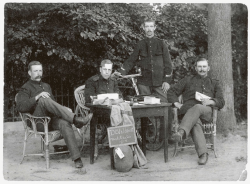 Antony Kok stond bekend als een bedachtzaam en vrijgevig man. Hij was een groot kunstminnaar en een mecenas, niet alleen voor bijvoorbeeld Piet Mondriaan maar ook voor regionale kunstenaars. In de jaren na het overlijden van zijn vriend Theo van Doesburg schreef hij nog zelden gedichten, maar legde zich geheel toe op het schrijven van aforismen.Tot aan zijn dood zou hij er vele duizenden schrijven, die hijzelf echter nooit heeft gepubliceerd.
Antony Kok stond bekend als een bedachtzaam en vrijgevig man. Hij was een groot kunstminnaar en een mecenas, niet alleen voor bijvoorbeeld Piet Mondriaan maar ook voor regionale kunstenaars. In de jaren na het overlijden van zijn vriend Theo van Doesburg schreef hij nog zelden gedichten, maar legde zich geheel toe op het schrijven van aforismen.Tot aan zijn dood zou hij er vele duizenden schrijven, die hijzelf echter nooit heeft gepubliceerd.
In 1942 ging Antony Kok met pensioen bij de spoorwegen. De jaren daarna zou hij zijn belangstelling voor het spiritisme en de filosofie verder cultiveren en zich in 1946 aansluiten bij de beweging van De Rozenkruisers. Ter wille van die beweging verhuisde hij in 1952 naar Haarlem. In deze stad maakte Kok kennis met de schilder Kees Verweij, die ruim veertig portretten van hem maakte. De tekeningen, die door Kok van een titel waren voorzien, werden tentoongesteld, onder andere in het Stedelijk Museum Amsterdam en het Van Abbemuseum in Eindhoven (1954-1955).
Op 29 oktober 1969 overleed Antony Kok op 87-jarige leeftijd. De meeste publicaties van en over zijn werk kwamen na zijn dood tot stand. Als gevolg van de toegenomen belangstelling voor zijn werk en zijn persoon, werd begin 1985 in de Stadsschouwburg/Kultureel Sentrum van Tilburg nog een grote tentoonstelling aan de ‘Dichter bij De Stijl‘ gewijd.
Meer informatie over Antony Kok op website: www.antonykok.nl
Dit artikel verscheen eerder in: J. van Oudheusden, e.a. (red.), Brabantse biografieën. Levensbeschrijvingen van bekende en onbekende Noordbrabanders. Deel 1, Amsterdam/Meppel, 1992.
Verder gepubliceerd op 14 september 2017 op de website Brabants Erfgoed: https://www.brabantserfgoed.nl/
Op 29 oktober 2019 is het precies 50 jaar geleden dat Antony Kok, schrijver en experimenteel dichter, overleed in een Haarlems ziekenhuisbed.
 Tot en met 5 januari 2020 is er een expositie te zien in het Dordrechts Museum over de Haarlemse kunstschilder Kees Verwey, onder de titel: Kees Verwey en zijn idolen. Hier zijn ook 30 portretten te zien van Antony Kok (gemaakt door Verwey) uit de collectie van het Rijksmuseum.
Tot en met 5 januari 2020 is er een expositie te zien in het Dordrechts Museum over de Haarlemse kunstschilder Kees Verwey, onder de titel: Kees Verwey en zijn idolen. Hier zijn ook 30 portretten te zien van Antony Kok (gemaakt door Verwey) uit de collectie van het Rijksmuseum.
Bij deze expositie in Museum Dordrecht, verscheen de publicatie: Kees Verwey en zijn idolen.
Één van de hoofdstukken heeft als titel: ‘Antony Kok had me te pakken’ en is geschreven door de Antony Kok biografen Hanneke van Kempen en Jef van Kempen.
Kees Verwey en zijn idolen
Dordrechts Museum
2019
ISBN 978-90-71722-30-1
Redactie: Laura van den Hout, Judith Spijksma, Linda Janssen
‘Antony Kok had me te pakken’ door Hanneke van Kempen en Jef van Kempen geeft een beeld van de gang van zaken rond de vriendschap van Antony Kok en de Haarlemse schilder Kees Verwey en is geïllustreerd.
https://www.dordrechtsmuseum.nl/
antonykok.nl magazine
fleursdumal.nl magazine
29 oktober 2019

More in: Agnita Feis, Antony Kok, Archive K-L, DADA, De Stijl, Essays about Van Doesburg, Kok, Mondriaan, Schwitters, Milius & Van Moorsel, Evert en Thijs Rinsema, Hanneke van Kempen, Jef van Kempen, Kurt Schwitters, Kurt Schwitters, Literaire sporen, Piet Mondriaan, Theo van Doesburg, Theo van Doesburg

Thy Days Are Done
Thy days are done, thy fame begun;
Thy country’s strains record
The triumphs of her chosen Son,
The slaughter of his sword!
The deeds he did, the fields he won,
The freedom he restored!
Though thou art fall’n, while we are free
Thou shalt not taste of death!
The generous blood that flow’d from thee
Disdain’d to sink beneath:
Within our veins its currents be,
Thy spirit on our breath!
Thy name, our charging hosts along,
Shall be the battle-word!
Thy fall, the theme of choral song
From virgin voices pour’d!
To weep would do thy glory wrong:
Thou shalt not be deplored.
George Gordon Byron
(1788 – 1824)
Thy Days Are Done
(Poem)
• fleursdumal.nl magazine
More in: Archive A-B, Archive A-B, Byron, Lord
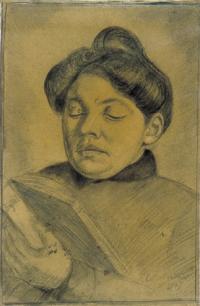
De
verlaten
loopgraaf
Een wond
in d’ aard!
Een geul!
Een spleet!
Deed dat
de mensch,
die denkt,
die weet?
Arm, voet,
been, hoofd,
‘t ligt al
dooreen.
Men zoekt
een mensch!
Er is
er geen!
Slechts bloed!
slechts stank!
Slechts lijk!
Slechts dood!
Op, op!
Meer moord.
Uw land
blijv’ groot!
Agnita Feis
(1881 – 1944)
Uit: Oorlog. Verzen in Staccato (1916).
De verlaten loopgraaf
• fleursdumal.nl magazine
More in: *War Poetry Archive, Agnita Feis, Archive E-F, Doesburg, Theo van, Essays about Van Doesburg, Kok, Mondriaan, Schwitters, Milius & Van Moorsel, Feis, Agnita, Kok, Antony, WAR & PEACE
A Little Novel
(in four little chapters)
CHAP. I
A little nook in garden shady;
A little squeeze of finger-tips ;
A little question to a lady;
A little “Yes** from rosy lips.
CHAP. II
A little flirting with another;
A little shadow on a blind;
A little tiff, a little bother:
A little bit of Beauty’s mind.
CHAP. III
A little coolness in the greeting;
A little rift within the lute;
A little hour of wild entreating;
A little lady, proudly mute.
CHAP. IV
A little note of sad upbraiding ;
A little poison in a glass;
A little willow-tree o’ershading
A little tomb-stone in the grass.
Montague Horatio Mostyn Turtle Pigott
(1865–1927)
Melody versus Malady (Poem)
• fleursdumal.nl magazine
More in: Archive O-P, Archive O-P, Mostyn Turtle Pigott
Susan Sontag
The definitive portrait
The definitive portrait of one of the American Century’s most towering intellectuals: her writing and her radical thought, her public activism and her hidden private face
N o writer is as emblematic of the American twentieth century as Susan Sontag. Mythologized and misunderstood, lauded and loathed, a girl from the suburbs who became a proud symbol of cosmopolitanism, Sontag left a legacy of writing on art and politics, feminism and homosexuality, celebrity and style, medicine and drugs, radicalism and Fascism and Freudianism and Communism and Americanism, that forms an indispensable key to modern culture.
o writer is as emblematic of the American twentieth century as Susan Sontag. Mythologized and misunderstood, lauded and loathed, a girl from the suburbs who became a proud symbol of cosmopolitanism, Sontag left a legacy of writing on art and politics, feminism and homosexuality, celebrity and style, medicine and drugs, radicalism and Fascism and Freudianism and Communism and Americanism, that forms an indispensable key to modern culture.
She was there when the Cuban Revolution began, and when the Berlin Wall came down; in Vietnam under American bombardment, in wartime Israel, in besieged Sarajevo. She was in New York when artists tried to resist the tug of money—and when many gave in. No writer negotiated as many worlds; no serious writer had as many glamorous lovers.
Sontag tells these stories and examines the work upon which her reputation was based. It explores the agonizing insecurity behind the formidable public face: the broken relationships, the struggles with her sexuality, that animated—and undermined—her writing. And it shows her attempts to respond to the cruelties and absurdities of a country that had lost its way, and her conviction that fidelity to high culture was an activism of its own.
Utilizing hundreds of interviews conducted from Maui to Stockholm and from London to Sarajevo—and featuring nearly one hundred images—Sontag is the first book based on the writer’s restricted archives, and on access to many people who have never before spoken about Sontag, including Annie Leibovitz. It is a definitive portrait—a great American novel in the form of a biography.
Benjamin Moser was born in Houston. He is the author of Why This World: A Biography of Clarice Lispector, a finalist for the National Book Critics’ Circle Award and a New York Times Notable Book. For his work bringing Clarice Lispector to international prominence, he received Brazil’s first State Prize for Cultural Diplomacy. He has published translations from French, Spanish, Portuguese, and Dutch. A former books columnist for Harper’s Magazine and The New York Times Book Review, he has also written for The New Yorker, Conde Nast Traveler, and The New York Review of Books.
Sontag
Her Life and Work
By Benjamin Moser
Hardcover: 832 pages
Illustrated
Language: English
Ecco/HarperCollins Publishers
September 17, 2019
ISBN-10: 0062896393
ISBN-13: 978-0062896391
$39.99.
Benjamin Moser:
Sontag – Haar leven en werk.
Uit het Engels vertaald door
Koos Mebius en Lidwien Biekmann.
De Arbeiderspers;
816 pagina’s;
€ 49,99.
# more books
Susan Sontag
Biography
• fleursdumal.nl magazine
More in: #Biography Archives, - Book News, - Bookstores, Archive S-T, Art & Literature News, Feminism, LGBT+ (lhbt+), Susan Sontag
Der weiße Wolf
Ein König ritt jagen in einem großen Walde, darinnen er sich verirrte, und mußte manchen Tag wandern und manche Nacht, fand immer nicht den rechten Weg und mußte Hunger und Durst leiden. Endlich begegnete ihm ein kleines schwarzes Männlein, das fragte der König nach dem rechten Weg. »Ich will dich wohl führen und geleiten«, sagte das Männlein, »aber du mußt mir auch  etwas dafür geben, du mußt mir das geben, was dir aus deinem Hause zuerst entgegen kommt.« Der König war froh und sprach unterwegs: »Du bist recht brav, Männchen; wahrlich und wenn mein bester Hund mir entgegenlief, so wollt ich dir ihn doch gern zum Lohne geben.« Das Männlein aber erwiderte: »Deinen besten Hund, den mag ich nicht, mir ist was andres lieb.« Wie sie nun beim Schlosse ankamen, so sah des Königs jüngste Tochter durchs Fenster ihren Vater geritten kommen und sprang ihm fröhlich entgegen. Da sie ihn aber in ihre Arme schloß, sprach er: »Ei wollt ich doch, daß lieber mein bester Hund mir entgegen gekommen wäre!« Über diese Rede erschrak die Königstochter gar sehr, und weinte und rief: »Wie das, mein Vater? Ist dir dein Hund lieber denn ich, und sollte er dich froher willkommen heißen?« aber der König tröstete sie und sagte: »O liebe Tochter, so war es ja nicht gemeint!« und erzählte ihr alles. Sie aber blieb ganz standhaft und sagte: »Es ist besser so, als daß mein lieber Vater umgekommen wäre im wilden Walde«, und das Männchen sagte: »Nach acht Tagen hole ich dich.«
etwas dafür geben, du mußt mir das geben, was dir aus deinem Hause zuerst entgegen kommt.« Der König war froh und sprach unterwegs: »Du bist recht brav, Männchen; wahrlich und wenn mein bester Hund mir entgegenlief, so wollt ich dir ihn doch gern zum Lohne geben.« Das Männlein aber erwiderte: »Deinen besten Hund, den mag ich nicht, mir ist was andres lieb.« Wie sie nun beim Schlosse ankamen, so sah des Königs jüngste Tochter durchs Fenster ihren Vater geritten kommen und sprang ihm fröhlich entgegen. Da sie ihn aber in ihre Arme schloß, sprach er: »Ei wollt ich doch, daß lieber mein bester Hund mir entgegen gekommen wäre!« Über diese Rede erschrak die Königstochter gar sehr, und weinte und rief: »Wie das, mein Vater? Ist dir dein Hund lieber denn ich, und sollte er dich froher willkommen heißen?« aber der König tröstete sie und sagte: »O liebe Tochter, so war es ja nicht gemeint!« und erzählte ihr alles. Sie aber blieb ganz standhaft und sagte: »Es ist besser so, als daß mein lieber Vater umgekommen wäre im wilden Walde«, und das Männchen sagte: »Nach acht Tagen hole ich dich.«
Und nach acht Tagen richtig, da kam ein weißer Wolf in das Königsschloß, und die Königstochter mußte sich auf seinen Rücken setzen, und heisa, da ging’s durch dick und dünn, bergauf und ab, und die Königstochter konnte das Reiten auf dem Wolf nicht aushalten, und fragte: »Ist’s noch weit?« – »Schweig! Weit weit ist’s noch zum gläsernen Berge – schweigst du nicht, so werf ich dich herunter!« Nun ging es wieder so fort, bis die arme Königstochter wieder zagte und klagte und fragte, ob es noch weit sei? Und da sagte ihr der Wolf die nämlichen drohenden Worte, und rannte immer fort, immer weiter, bis sie zum drittenmale die Frage wagte, da warf er sie auf der Stelle von seinen Rücken herunter und rannte davon.
Nun war die arme Prinzessin ganz allein in dem finstern Walde, und ging und ging und dachte, endlich werde ich doch einmal zu Leuten kommen. Und endlich kam sie an eine Hütte, da brannte ein Feuerchen und da saß ein altes Waldmütterchen, das hatte ein Töpfchen am Feuer. Und da fragte die Königstochter: »Mütterchen, hast du den weißen Wolf nicht gesehen?« – »Nein, da mußt du den Wind fragen, der fragt überall herum, aber bleibe erst noch ein wenig hier, und iß mit mir. Ich koche hier ein Hühnersüppchen.« Das tat die Prinzessin, und als sie gegessen hatten, sagte die Alte: »Nimm die Hühnerknöchelchen mit dir, du wirst sie gut gebrauchen können.« Dann zeigte ihr die Alte den rechten Weg nach dem Winde.
Als die Königstochter bei dem Winde ankam, fand sie ihn auch am Feuer sitzen und sich eine Hühnersuppe kochen, aber auf ihre Frage nach dem weißen Wolf antwortete er ihr: »Liebes Kind, ich habe ihn nicht gesehen, ich bin heute einmal nicht gegangen, und wollte mich einmal hübsch ausruhen. Frage die Sonne, die geht alle Tage auf und unter, aber erst mache es wie ich, ruhe dich aus, und iß mit mir, kannst hernach auch alle die Hühnerknöchlein mit dir nehmen, wirst sie wohl gut brauchen können.«
Als dies geschehen war, ging die Kleine nach der Sonne zu, und es ging da gerade wieder wie beim Winde, die Sonne kochte sich gerade eine Hühnersuppe an sich selbst, daher es damit sehr geschwind ging, hatte auch den weißen Wolf nicht gesehen, und lud  die Prinzessin zum Mitessen ein. »Du mußt den Mond fragen, denn wahrscheinlich läuft der weiße Wolf nur des Nachts, und da sieht der Mond alles.« Als nun die Königstochter mit der Sonne gegessen und die Knöchlein aufgesammelt hatte, ging sie weiter und fragte den Mond. Auch er kochte Hühnersuppe und sagte: »Es ist fatal, ich habe letzt nicht geschienen, oder bin zu spät aufgegangen, ich weiß gar nichts von dem weißen Wolf.« Da weinte das Mädchen und rief: »O Himmel, wen soll ich nun fragen?« – »Nun nur Geduld mein Kind«, sagte der Mond. – »Vor Essen, wird kein Tanz, setze dich und iß erst die Hühnersuppe mit mir und nimm auch die Knöchelchen mit, du wirst sie wohl brauchen. Etwas Neues weiß ich doch; im gläsernen Berge das schwarze Männchen – das hält heute Hochzeit, der Mann im Mond ist auch dazu eingeladen.« – »Ach der gläserne Berg, der gläserne Berg! dahin wollte ich ja eben, dahin hat mich ja der weiße Wolf tragen sollen!« rief die Königstochter. »Nun bis dorthin kann ich dir schon leuchten und den Weg zeigen«, sagte der Mond, »sonst könntest du dich leichtlich irren, denn ich zum Beispiel bestehe ganz und gar aus lauter gläsernen Bergen. Nimm immer deine Knöchlein hübsch alle mit.« Das tat die Prinzessin, aber in der Eile vergaß sie doch ein Knöchlein.
die Prinzessin zum Mitessen ein. »Du mußt den Mond fragen, denn wahrscheinlich läuft der weiße Wolf nur des Nachts, und da sieht der Mond alles.« Als nun die Königstochter mit der Sonne gegessen und die Knöchlein aufgesammelt hatte, ging sie weiter und fragte den Mond. Auch er kochte Hühnersuppe und sagte: »Es ist fatal, ich habe letzt nicht geschienen, oder bin zu spät aufgegangen, ich weiß gar nichts von dem weißen Wolf.« Da weinte das Mädchen und rief: »O Himmel, wen soll ich nun fragen?« – »Nun nur Geduld mein Kind«, sagte der Mond. – »Vor Essen, wird kein Tanz, setze dich und iß erst die Hühnersuppe mit mir und nimm auch die Knöchelchen mit, du wirst sie wohl brauchen. Etwas Neues weiß ich doch; im gläsernen Berge das schwarze Männchen – das hält heute Hochzeit, der Mann im Mond ist auch dazu eingeladen.« – »Ach der gläserne Berg, der gläserne Berg! dahin wollte ich ja eben, dahin hat mich ja der weiße Wolf tragen sollen!« rief die Königstochter. »Nun bis dorthin kann ich dir schon leuchten und den Weg zeigen«, sagte der Mond, »sonst könntest du dich leichtlich irren, denn ich zum Beispiel bestehe ganz und gar aus lauter gläsernen Bergen. Nimm immer deine Knöchlein hübsch alle mit.« Das tat die Prinzessin, aber in der Eile vergaß sie doch ein Knöchlein.
Bald stand sie an dem gläsernen Berge, aber der war ganz glatt und glitschig, da war nicht hinauf zu kommen, aber da nahm die Königstochter alle Hühnerknöchlein von der alten Waldmutter, von dem Wind, von der Sonne und von dem Monde, und machte sich daraus eine Leiter, die wurde sehr lang, aber o weh, zuletzt fehlte noch eine einzige Sprosse, noch ein Glied. Da schnitt sich die Prinzessin das oberste Gelenk von ihrem kleinen Finger ab, und so tat es gut, und sie konnte nun rasch zum Gipfel des gläsernen Berges klimmen. Oben war eine große Öffnung, da führte eine schöne Treppe hinunter, und war alles voll Glanz und Pracht, und war ein Saal da voll Hochzeitgäste und viele Musikanten und reichbesetzte Tafeln. Und da saß das schwarze Männlein und an seiner Seite saß eine Dame, die war seine Braut, das schwarze Männlein aber schien traurig. Und der Königstochter tat es auch so weh, so weh, daß sie nun zu spät kam, und daß das schwarze Männlein so traurig war, und dachte bei sich, ich will ein Lied vom weißen Wolf singen, vielleicht kennt er mich dann – denn er hatte sie noch gar nicht angesehen, folglich auch nicht wieder erkannt. Und da stand eine Harfe an der Wand, welche die Prinzessin gut spielte, die nahm sie nun und sang
»Deinen besten Hund, den mag ich nicht,
Mir ist was andres lieb!
Die jüngste Königstochter.
Der weiße Wolf, der lief davon,
Sie weiß nicht, wo er blieb;
Die jüngste Königstochter.«
Da horchte das schwarze Männlein hoch auf,
aber die Prinzessin fuhr fort zu spielen und zu singen.
»Sie ist dem Wolfe nachgereist,
Schnitt ab ihr Fingerglied,
Die jüngste Königstochter.
Nun ist sie da – du kennst sie nicht,
Traurig singt dir dies Lied
Die jüngste Königstochter.«
Da sprang das schwarze Männlein von seinem Sitze auf und war plötzlich ein ganz schöner junger Prinz und eilte auf sie zu, und schloß sie in seine Arme.
Alles war Zauber gewesen. Der Prinz war in das alte Männlein und in den weißen Wolf und in den gläsernen Berg hinein verzaubert so lange bis eine Prinzessin, um zu ihm zu gelangen, sich’s ein Glied von ihrem kleinen Finger kosten lassen würde, wenn das aber bis zu einer gewissen Zeit nicht geschähe, so müsse er eine andre freien und ein schwarzes Männlein bleiben all sein Leben lang. Nun war der Zauber gelöst, die andre Braut verschwand, der entzauberte Prinz heiratete die Königstochter, reiste darauf mit ihr zu ihrem Vater, der sich herzlich freute, sie wieder zu sehen, und lebten alle glücklich miteinander bis an ihr Ende. Sollte dieses aber nicht erfolgt sein, so ist es einigermaßen wahrscheinlich, daß sie noch heute leben.
Ludwig Bechstein
(1801 – 1860)
Der weiße Wolf
Sämtliche Märchen
• fleursdumal.nl magazine
More in: Archive A-B, Bechstein, Bechstein, Ludwig

Protestgedicht, 1968
(gevonden in een oud schoolboek van een soixante-huitard)
Ga weg, op uw plaats wil ik zitten.
Va-t’en, gij daar in uw driedelig grijs.
De tijd is rijp voor nieuwe winden.
Wij willen grote auto’s, en een parking
voor onszelf. Want ruimte moet er zijn.
Recht hebben wij daarop, besef dat wel.
Het volk moet alles weten, iedereen toch
evenveel ongeveer. Af willen wij van geloven
in de Werkelijke Tegenwoordigheid, af!
En negers mogen dromen wat ze willen,
maar negers mogen zij niet meer heten.
Ouden-van-dagen bestaan niet meer
en vrouwen moeten kinderen wíllen.
Herenigen zullen wij hier families die
uit hun bergdorpen oma’s willen en net
zo ongeletterde bruiden. Opvoeden zullen
wij het volk vanachter megafoons en vanaf
uitklaphoezen, beschijnen met nieuw licht.
Ga weg, maak onze plaats snel vrij nu.
Wij pardonneren u uw desertie.
Wij vergeven jou jouw deesertsie.
Bert Bevers
Ongepubliceerd
Bert Bevers is a poet and writer who lives and works in Antwerp (Be)
• fleursdumal.nl magazine
More in: Archive A-B, Archive A-B, Bevers, Bert
Thank you for reading Fleurs du Mal - magazine for art & literature